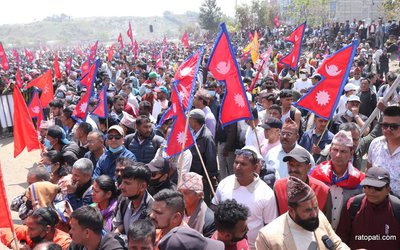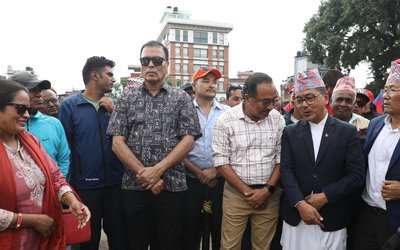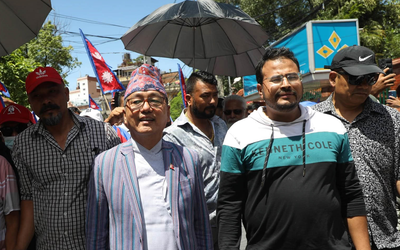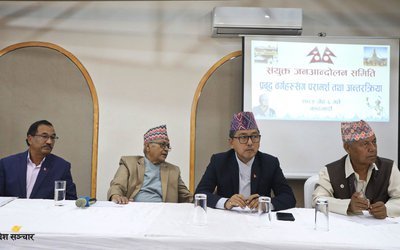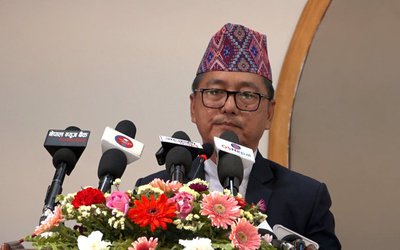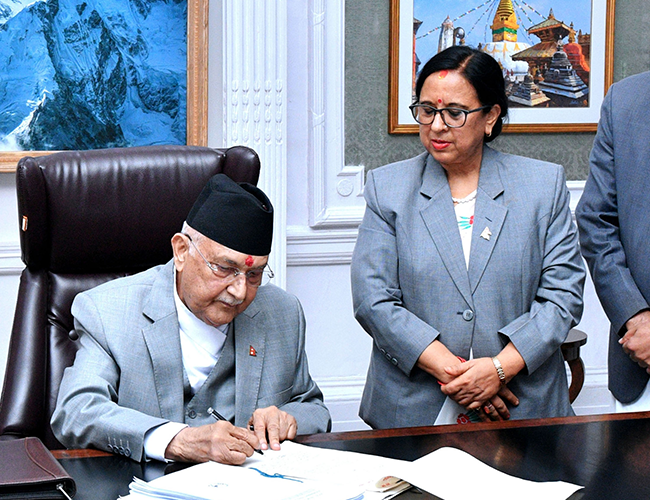
Famed American political theorists Leo E. Rose, who authored numerous articles and books in the 1970s and 1980s on the impact of Nepal's geographical location on its internal political dynamics, posited that external factors play a crucial role in the domestic politics of small nations, whereas internal dynamics significantly influence the foreign policy of larger countries. What Rose articulated decades ago remains pertinent not only to Nepal but to many other small nations globally. The extensive media coverage in India and the limited media attention from China on the recent change in government in Nepal underscore the influence of international politics on domestic affairs.
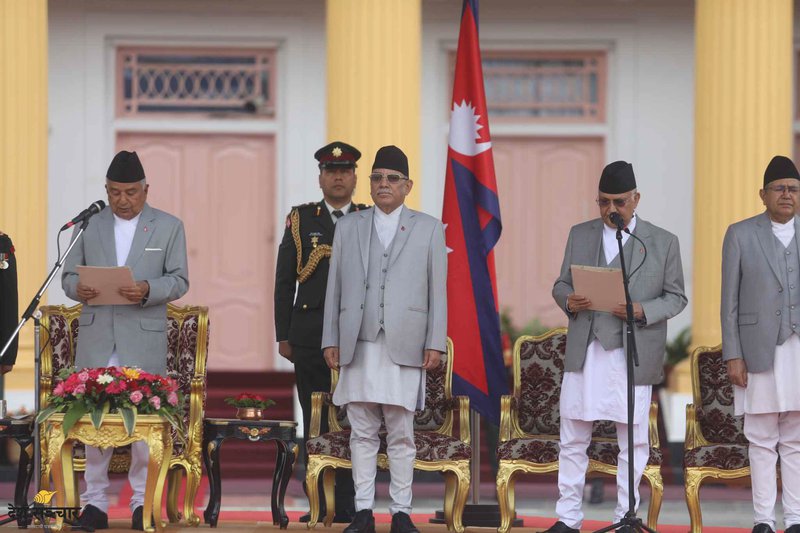
As President Ram Chandra Paudel administered the oath of office and secrecy to Prime Minister Oli and his entire cabinet, including two deputy prime ministers, on Monday (July 15), political analysts have begun speculations regarding the stability of this government. Achieving political stability has been elusive for Nepal for over 34 years since the country transitioned into a multi-party democracy, initially through a constitutional monarchy in 1991 and later as a republic in 2006. The initial phase witnessed 15 changes in government, and Oli will serve as the 13th prime minister in 17 years in the republic. However, the change this time has been marked by a mysterious and, at times, conspiratorial process. Just four months prior, Pushpa Kamal Dahal, also known as "Prachanda," expelled the Nepali Congress from the ruling coalition and formed an alliance with the Communist Party of Nepal (United Marxist-Leninist), with Oli and Prachanda vowing to remain united in "heaven and hell."
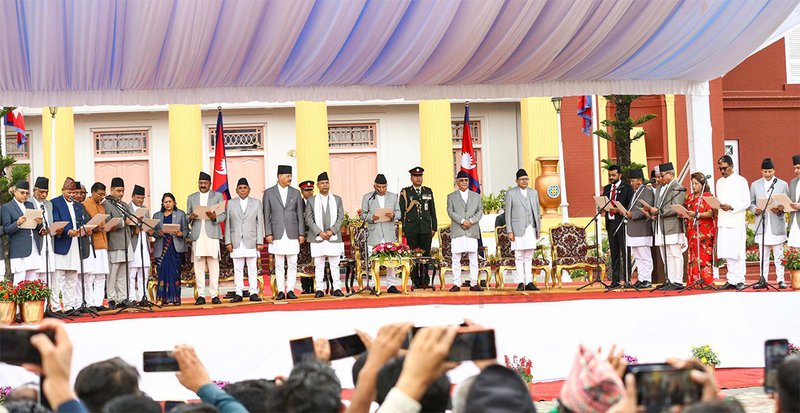
Every former Prime Minister of Nepal has exhibited a distinct trait: a reluctance to accept responsibility for failures in governance, a struggling economy, widespread corruption, and a lack of clear political principles guiding their actions. Additionally, almost every former Prime Minister has encountered foreign interference in their exit from office but has not experienced the same during their rise to power.
Prachanda was no different in this regard when he stated that the political faction taking over his position would have been nearly impossible to create from within the country's own ranks, despite external powers having long shown interest in Nepal's internal affairs.
Oli, serving as Nepal's 12th Prime Minister since 2008, has been in office for just 16 years. The country's political landscape is characterized by chronic instability. Prachanda faced numerous challenges since his appointment as Prime Minister in December 2022, including five no-confidence motions in just two years. The primary reason for the frequent turnover of Prime Ministers and governments in Nepal is the competitive nature among its leaders.
"In Nepal, power is concentrated in a select elite, predominantly from the upper class and upper caste. Given the social homogeneity of this ruling class, changes in government do not lead to significant social or economic disruptions. It quickly returns to normalcy after a change," reports Indian media.
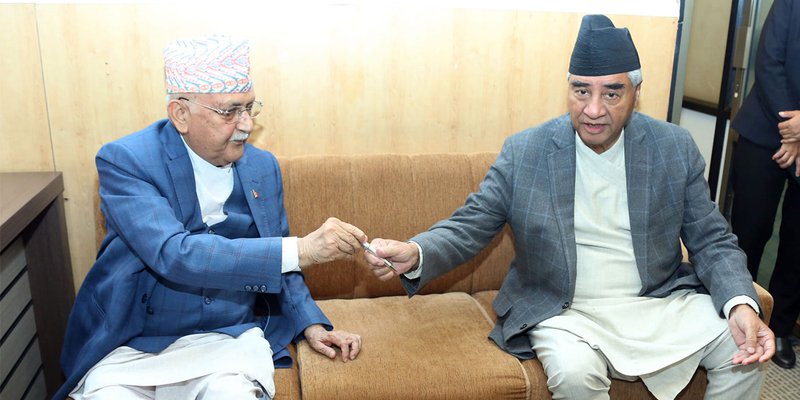
Beyond formal titles, there are no genuine ideological differences at the core. Communist parties form alliances supposedly for ideological reasons but often break up due to personality conflicts.
Initially, the Communist Party of Nepal-Maoist Centre, led by Prachanda, formed a coalition and government with the Communist Party of Nepal-Unified Marxist Leninist, led by Oli. However, this "ideological" coalition fell apart over issues such as a recruitment scandal, Ambassadorial appointments, and proposals for constitutional amendments.
In his book "Strategy for Survival," published in 1969, the late Rose discusses the political challenges faced by King Prithvi Narayan Shah and King Mahendra.
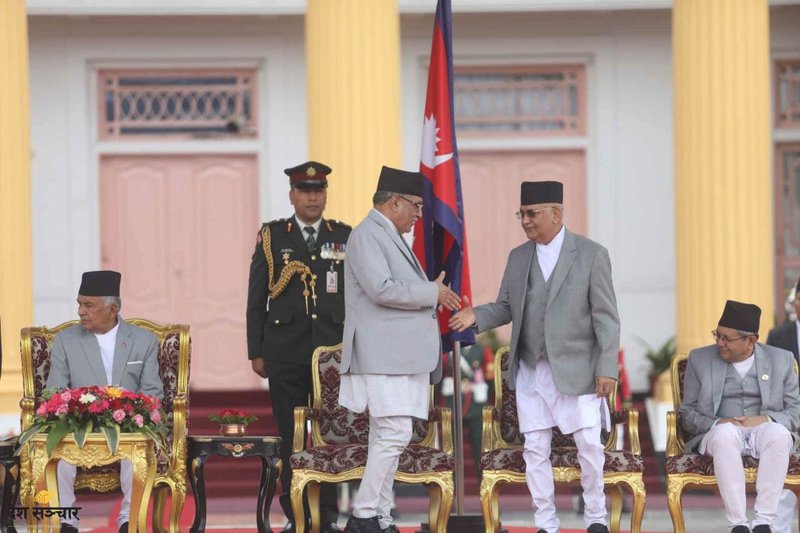
Comparing Rose's insights from the political system following the collapse of the Panchayat system and the establishment of a multi-party democracy in 1990, to the current state of Nepal, it is evident that political instability remains a constant feature of the country's political landscape.
Despite the stability of Nepal's institutional monarchy, the changeover from government was consistent, occurring approximately every five years starting from 1990. During this period, Nepal witnessed 15 transitions of leadership. Since then, Nepal, under republican rule, continues its path, encountering more challenges due to the introduction of new institutions and the presence of leaders with power aspirations and weaknesses.
The cabinet under Prime Minister Oli, with support from Deputy Prime Minister Prakash Man Singh and other ministers from the Nepali Congress, United Marxist Labour, Janata Samajbadi Party, and Loktantrik Samajbadi Party, now includes representatives from various parties. The Nepali Congress and United Marxist Labour have allocated four ministries to other parties in the federal parliament, indicating the likelihood of further parties joining Oli's cabinet.
The Nepali Congress, through its member Prakash Man Singh, has joined Oli's Cabinet as Deputy Prime Minister and Urban Development Minister. Bisnhu Poudel, a leader from the CPN-UML, has also taken up the role of Deputy Prime Minister with responsibility for Finance.
Oli's resurgence as Prime Minister
Whether the reunion was merely a coincidence or part of a larger plan, Prime Minister Oli and Deputy Prime Minister Deuba met earlier to discuss the possibility of forming a new political alliance, following a visit by the Chinese vice foreign minister.
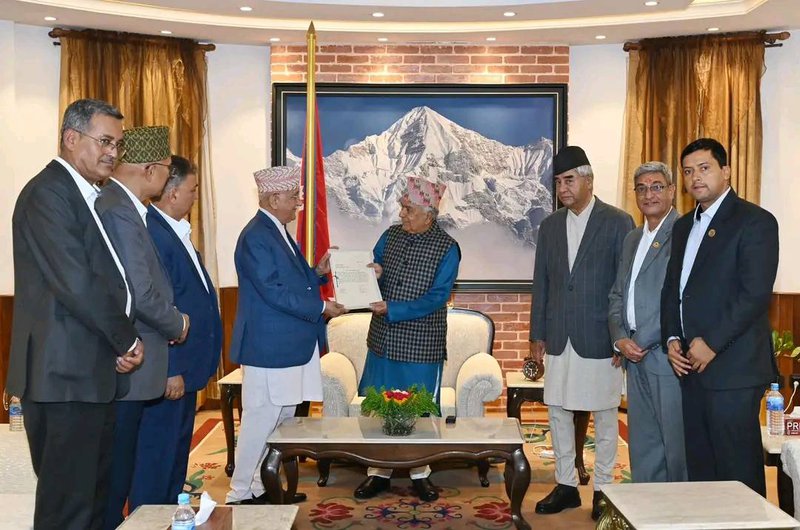
After their discussion, Oli and Deuba, leaders of the United Marxist Labour and Nepali Congress respectively, met at a residence of a helicopter captain and the owner of Simrik Air. This meeting marked the end of a political alliance with the Prachanda-led government, which had been in place for just four months since joining the government.
With 78 seats in the parliament, the Nepali Congress and Oli's party have agreed on a power-sharing deal. This deal allows Prime Minister Oli to resume office for 21 months before handing over to Prime Minister Sher Bahadur Deuba for the remaining term until the next general election in 2084 (2027).
Regarding relations with India
Upon his return to power, the CPN-UML has asserted that Nepal's path to economic prosperity lies in maintaining strong friendly ties with India. They have also made it clear that Nepal will not tolerate any activities against India on its territory.
Nepal borders five Indian states – Sikkim, West Bengal, Bihar, Uttar Pradesh, and Uttarakhand – covering an expansive stretch of over 1,850 kilometers. From an Indian perspective, Nepal holds significant strategic value in the region, prompting substantial investments in its infrastructure.
A leading figure from the United Marxist Leninist (UML) stated that the current government is aiming to elevate Nepal-India relations to new heights, aiming to attract foreign investment, boost trade, and achieve economic development.
Rajan Bhattarai, the head of the foreign policy department for the CPN (UML) party, commented to The Indian Express, "We maintain complex ties with India, which is crucial in realizing the vision of a prosperous Nepal and a content Nepali population." He also made it clear that there would be no major changes in Nepal's approach towards India or China.
However, Bhattarai indicated that it's essential to address current issues related to border disputes, trade imbalances, and issues concerning water and transit. He also mentioned that Nepal's stance on the dispute over the Kalapani region, which is strategically important due to its location at the crossroads of India, China, and Nepal, would not change. Nepal is open to discussing the issue with India, but Bhattarai emphasized the importance of considering historical facts in these discussions.
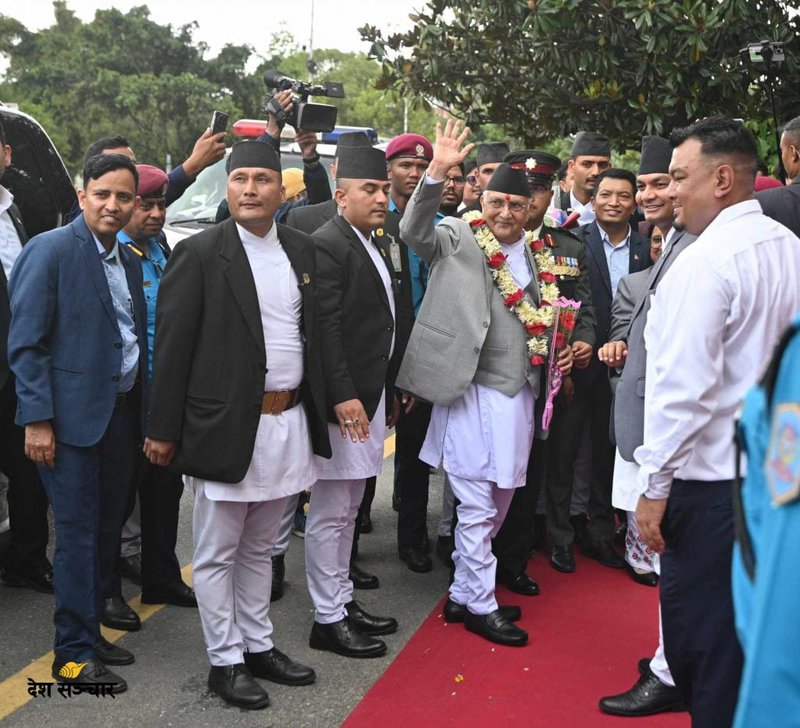
Bhattarai reaffirmed Nepal's adherence to the historical principle that all territories east of the Kali river, including Limpiyadhura, Kalapani, and Lipulekh, belong to Nepal, in line with the 1816 Treaty of Sugauli.
Regarding the dispute over Nepal's new political map that depicts disputed areas, Bhattarai highlighted that Nepal's decision was a reaction to India's updated map following the reorganization of Jammu and Kashmir that included territories of Nepal.
The bilateral dialogues that were put on hold due to the ongoing boundary dispute have been resumed towards the latter part of 2020, with high-level visits reflecting New Delhi's view of itself as Nepal's primary friend and partner in development.
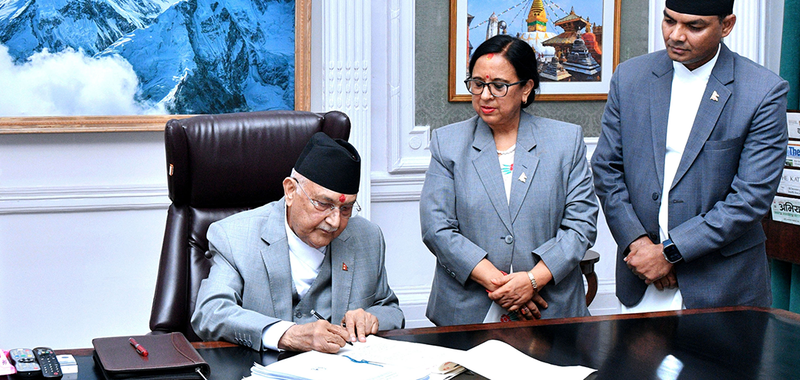
Despite his firm position on maintaining close ties with India, Oli has recognized the importance of India as a key development partner and has committed to finding a balance in Nepal's relations with both India and China.
On the topic of China's Belt and Road Initiative (BRI), while Nepal has been putting its signature on the implementation plans, it's unlikely that Oli or any future leader will reconsider Nepal's decision to join the initiative in 2017. However, the issue of financing remains a concern, with warnings about Nepal avoiding becoming entangled in a Chinese debt crisis.
Moreover, there are Indian allegations that Oli was also engaging more closely with China and participating in projects under the Belt and Road Initiative.
Nepal, under the leadership of veteran communist Oli, is expected to adopt a neutral stance in international relations, prioritizing the country's interests and territorial integrity, with a strong emphasis on not allowing its territory to be used for targeting any other country, according to Oli's party, CPN (UML).
Nonetheless, Oli is anticipated to pressure India on unresolved issues such as the border dispute and trade imbalances, as Rajan Bhattarai, leader of the opposition party, Nepali Congress, has revealed to The Times of India.
Bhattarai further stated, “Once a country signs an agreement with the BRI, it becomes a non-negotiable matter.” This suggests Nepal is unlikely to withdraw from its commitments with the Belt and Road Initiative (BRI).
The Times of India also reported that Nepal, during the tenure of P K Dahal Prachanda as Prime Minister with the support of the People's Comprehensive Party (NC), participated in the Belt and Road Initiative. Given such an agreement, it is expected that such alliances would be maintained.
However, Bhattarai clarified that while the People's Comprehensive Party (NC) favors grant-based financing for BRI projects, not loans, the financial arrangements for the projects will be thoroughly discussed with the NC before any decisions are made on their execution.
On constitutional matters, there have been reports, though not officially confirmed, that the two parties have agreed to introduce a bill aimed at amending the constitution to focus on the electoral system, adopting a fully First-Past-the-Post System (FPTP) for the House of Representatives and Provincial Assemblies, replacing the current mixed FPTP and Proportional Representation (PRS) system. The ruling parties, CPN (UML) and Nepali Congress, argue in favor of the change, citing the current electoral system as a cause of political instability and advocating for the FPTP as a means to ensure stable and strong governance. However, the Communist Party of Nepal (Maoist Centre) (CPN-MC) opposes the move, expressing concerns that it would disproportionately benefit the higher castes.
In Nepal's electoral framework, 165 members of the House of Representatives are elected through the FPTP system, while 110 are elected under the PR system. The electoral system, a mix of FPTP and PR, applies to the members of the seven Provincial Assemblies, with 550 members. The opposition, particularly the Nepali Congress and CPN (UML), argue that the current system contributes to political instability and that a complete switch to FPTP for both houses and assemblies would lead to more stable and effective governance. On the other hand, the CPN-MC opposes this, believing it would unfairly benefit certain social groups over others.
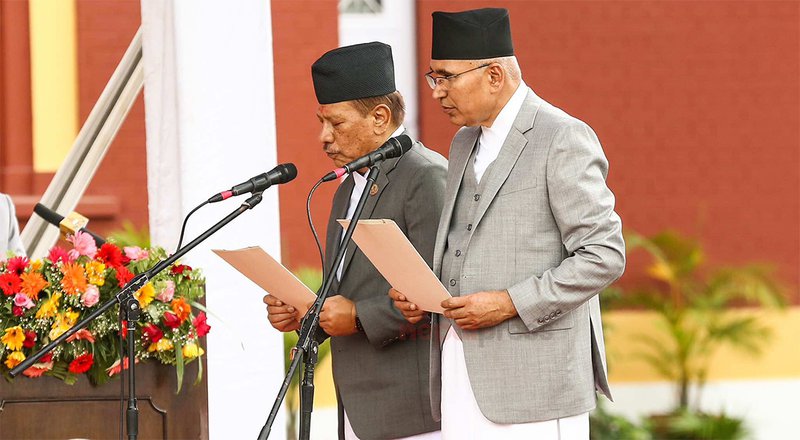
Leaders in politics often form alliances with each other. A supporter of monarchy has worked with a government led by Maoists in the past, together with CPN-UML, under the leadership of Maoist leader, PM Dr. Manmohan Singh. In a similar vein, the Nepali Congress and CPN-UML came together to form a government with the support of a monarchist party in a previous instance.
When Oli decided to dissolve the Parliament, he was left on his own. However, after three years, Oli, who was the head of the Communist Party of Nepal (UML), was appointed as the leader of the government by the Supreme Court, following its decision to invalidate his attempt to hold power as a caretaker Prime Minister for dissolving the House of Representatives twice.
China, a common visitor with high-level delegations to Nepal, has voiced its concerns, particularly about Nepal's strategic location. Yet, Nepal's dominant economic ties are with India. Despite this, Oli, in partnership with the Nepali Congress, seems to understand the impact of this relationship on his political future. Rajan Bhattarai, who served as Oli's foreign policy advisor, played a key role in this.
KP Sharma Oli is known for his challenging political journey, marked by frequent conflicts with India. Born in Eastern Nepal, he entered politics at the tender age of 14 in 1966. He became a member of the Communist Party of Nepal in 1970 and was incarcerated for his involvement in subversive activities for 14 years. Oli was greatly inspired by the teachings of Marx and Lenin, and his leadership of the Jhapa rebellion was a pivotal moment in Nepal's communist history, transitioning from its ideological beliefs to active warfare. Oli was pardoned in 1987 and became the inaugural leader of CPN-UML.
Influenced by Maoist rebels, Oli led the Jhapa rebellion, which was a critical juncture for the communist movement, elevating it from a minor faction to a ruling power. Oli was set free in 1987 and took on the role of the founding leader of CPN-UML. In the 1990s, he rose to prominence for his efforts in overthrowing the Panchayat dictatorship. After steadily climbing the ranks within the party, taking on significant roles such as chief of parliamentary affairs and deputy leader of the main opposition party, Oli was made the Deputy Prime Minister in the interim government headed by former Prime Minister GP Koirala.
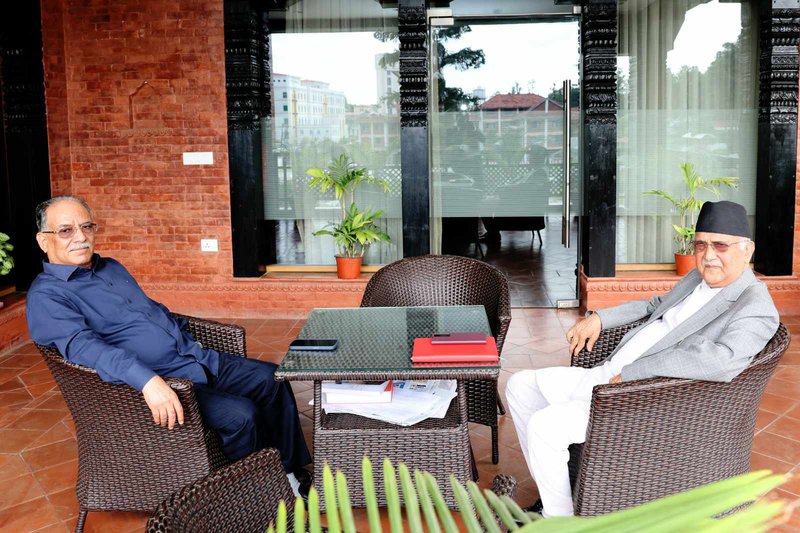
Emerging as a central figure in the political scene of Nepal, Oli assumed the role of Prime Minister on October 12, 2015, securing 338 of the total 597 votes. Yet, his tenure ended abruptly when he was compelled to step down following the CPN-Maoist Centre's withdrawal of support and the subsequent defeat of a no-confidence vote in Parliament.
He managed to regain the position of PM in 2018 through a coalition with Prachanda's party, but found himself embroiled in debates about the consolidation of authority, leading to Dahal's decision to back away from support. Oli swiftly dissolved the Parliament in 2020, announcing new elections, which sparked widespread anger among political parties yet garnered backing from the President. The Supreme Court's declaration of the dissolution as invalid, however, led to Oli's losing a second vote of confidence vote in 2021, making him a minority PM until the November 2021 election.
Throughout his reign, Oli's sharp-tongued approach, unwillingness to tolerate disagreement, and grandiose ambitions have been apparent. Compounding this, the numerous corruption allegations against him and his cohorts suggest that instability is likely to persist.

Keshab Poudel
Poudel is the editor of New Spotlight Magazine.
- FOURTH PROFESSOR Y.N. KHANAL LECTURE: Nepal-China Relations
- Jun 23, 2025
- Colonel JP CROSS: Centenary Birthday
- Jun 23, 2025
- REEEP-GREEN: Empowering Communities with MEP
- Jun 16, 2025
- BEEN: Retrofitted For Green
- May 28, 2025
- GGGI has been promoting green growth in Nepal for a decade: Dr. Malle Fofana
- May 21, 2025
